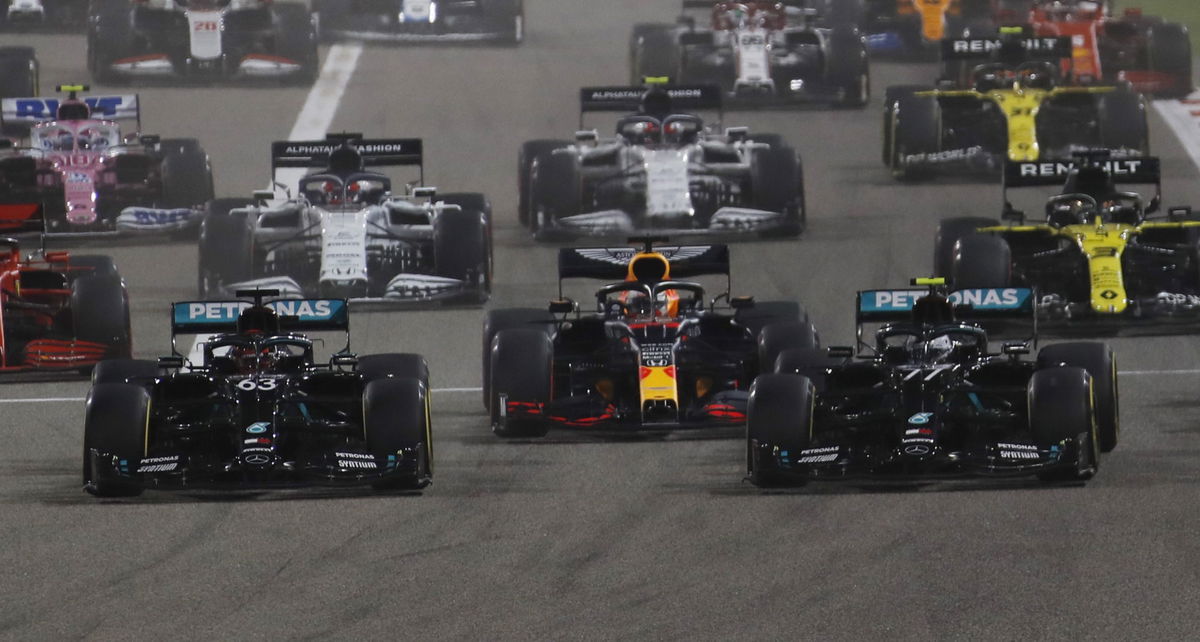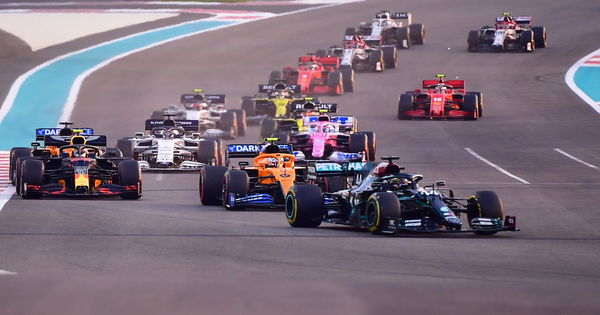
Reuters
Formula One F1 – Sakhir Grand Prix – Bahrain International Circuit, Sakhir, Bahrain – Mercedes’ George Russell leads and Valtteri Bottas is second placed after the start of the race Pool via REUTERS/Hamad I Mohammed

Reuters
Formula One F1 – Sakhir Grand Prix – Bahrain International Circuit, Sakhir, Bahrain – Mercedes’ George Russell leads and Valtteri Bottas is second placed after the start of the race Pool via REUTERS/Hamad I Mohammed
F1 has long been the aristocrat of the motorsport community, with many aspiring racers dreaming to compete in the division. With its rich history of legendary drivers and rivalries between the modern and traditional powerhouses, Formula 1 certainly makes for interesting viewing.
Watch What’s Trending Now!
However, their battery-operated electric contemporary, Formula E, has never received much attention. A significant factor in that is obviously down to relatively lesser power and speed, something that F1 cars rank in far, far ahead.
So, while the comparison might not be that surprising, there are still some interesting facts to look at.
ADVERTISEMENT
However, with developments with both divisions’ engines, we now seek to raise the question: is Formula E faster than F1?
F1 cars have superior maximum speeds compared to Formula E cars
The fuel-powered machinery have the obvious advantage in top speeds and pace on the straights of circuits. According to various reports, F1 cars can touch a maximum speed of up to 230 mph, while Formula E cars possess figures of somewhere around 174 mph.
ADVERTISEMENT
In addition, the power unit output with F1 cars can range anywhere between 875-1000 HP with the potential for an extra 160 HP through DRS activation. On the other hand, Formula E cars can produce a horsepower capacity of 270 HP in race mode, with a 335 HP in ‘fanboost mode’ the maximum limit.

Reuters
Formula One F1 – Abu Dhabi Grand Prix – Yas Marina Circuit, Abu Dhabi, United Arab Emirates – Mercedes’ Lewis Hamilton in action at the start of the race Pool via REUTERS/Giuseppe Cacace
The aerodynamics support and fine-tuning in designing both sets of race cars are naturally also different. With these a key component in streamlining speeds, this is another segment where F1 trumps.
ADVERTISEMENT
There are however no compromises in the quality of Formula E racing
Clearly then, from a numerical and observational point of view, there is no contest between Formula 1 and Formula E. The technological developments of building the V6 powertrains in the former have elevated the sport into a whole different dimension.
ADVERTISEMENT

Getty
MONTMELO, SPAIN – FEBRUARY 28: Max Verstappen of the Netherlands driving the (33) Red Bull Racing Red Bull-TAG Heuer RB13 TAG Heuer on track during day two of Formula One winter testing at Circuit de Catalunya in Montmelo, Spain. (Photo by Dan Istitene/Getty Images)
But that said, the competition in Formula E is quite gripping and at times, even outweighs the frequency of close battles in F1. The conception of the electric version of the racing league thus provides a very good level of excitement.
Top Stories
Language Barrier Didn’t Hold Back Lando Norris to “Hook Up” With OnlyFans Model: “We Talked by Mime”

Cadillac Star Sergio Perez Drops Bombshell Claims Over Red Bull Years After Ugly Exit

Can you Drink Alcohol at the Saudi Arabian GP in F1?

Who Is Lando Norris’ Girlfriend? Everything You Need to Know About Margarida Corceiro

Amid Confirmed Reports, Ferrari Release Dubious Statement Surrounding Future of F1 Team Principal Mattia Binotto

Therefore, motorsport now enters a new decade which will see a raft of changes in the power and accompanying speeds in both divisions. But for the time being though, F1 stands unchallenged relative to its electric fraternity.
ADVERTISEMENT
MORE – F1 2021: How the Rules & Regulations are Changing Compared to 2020
ADVERTISEMENT
ADVERTISEMENT
ADVERTISEMENT

